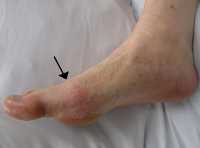Abuse and Neglect, Gout, Rheumatology / 22.06.2024
EULAR 2024: Gout Remission Achieved with Intensive Urate-Lowering KRYSTEXXA (pegloticase)
MedicalResearch.com Interview with:
Brian LaMoreaux, MD, MS
Internist and Rheumatologist
Executive Medical Director, Amgen
MedicalResearch.com: What is the background for this study? How does KRYSTEXXA® (pegloticase) work in gout?
Response: Many other diseases in gout have well-defined definitions of remission, but gout has lagged behind on this. With systemic consequences of gout becoming more apparent, the concept of treating gout to remission is increasing important to improving patient care and preserving patient health.
Our MIRROR randomized controlled trial (RCT) provides data beyond the primary and secondary endpoints and allows us to look at aspects like the rate of gout remission (i.e. serum urate level (SU) <6 mg/dL, absence of acute gout flare, absence of tophi, minimal gout-related pain, and minimal gout-related quality-of-life impact over a 12-month period) achieved with KRYSTEXXA-induced intensive urate-lowering. Continuing to advance knowledge that can positively impact patient care is our driving force for the research.
KRYSTEXXA is approved for the treatment of uncontrolled gout, for those experiencing signs and symptoms of gout despite taking oral medicines. It is the only gout treatment that controls uncontrolled gout by changing uric acid into a water-soluble substance called allantoin that he body easily gets rid of through urine. (more…)




